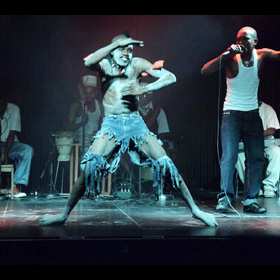Jagwa Music
Bio
Jagwa Music play a street music from Dar es Salaam called mchiriku. The group first emerged in 1992 as a spin-off from an earlier group playing chakacha at weddings and other celebrations. Their name Jagwa (from the French fighter plane) came up in opposition to their rivals which had named themselves Scud, all terminology coming down right from the first Gulf War.
Initially Jagwa’s sound was closer to chakacha, yet they developed their edge with the current members joining within the past ten years: Above all, these are the two kinanda (Casio) players Daliki and Diploma, intensifying the style with their minimalist feedback and distortion deluges, Mazinge’s and TP’s powerful and always shifting drumming patterns; and, more recently with current front man and main attraction Jackie joining. The latter is an energetic singer and performer, belting out songs and commentaries on day-to-day street life with never-ending vigor.
Jagwa’s songs typically comment on day-to-day issues of life in the city and many have become proverbial with time, titles or phrases being painted on the sides or backs of the dala dala bus taxis plying the streets of Dar es Salaam. Hardly dealing with unrequited love the songs advise on how to survive in the urban maze faced with unemployment, oppressive relatives, Aids and unfaithful girlfriends (or husbands for that matter), black magic, drugs and alcohol.
In one of their recent songs 'Mauaji Ya Maalbino' (‘The Killing of Albinos’) Jagwa have commented on the wide-spread killing and slaughtering of albino people, for selfish and pecuniary reasons. One of Jagwa’s best-loved songs is 'Maisha Popote' (‘One Can Live Anywhere in this World’). Jagwa Music’s first international CD release, 'Bongo Hotheads' was released in 2012. Main picture: W Graebner























